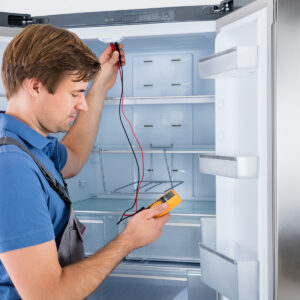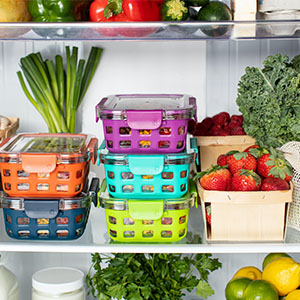
Before we get into the nitty-gritty, here's a stat to kick things off: Did you know that well-maintained refrigerators can use significantly less energy? That's not just good for your wallet; it's also a win for the planet! Now, let's explore some essential refrigerator maintenance tricks to keep your fridge humming efficiently.
First things first, a clean fridge is a happy fridge. Regular refrigerator maintenance starts with cleaning the inside of your fridge on a monthly basis. It might not be the most exciting task, but it's crucial for keeping germs away and your food safe.
Spill Response: Don't let spills linger! A quick cleanup when something spills is like giving your fridge a high-five for keeping things tidy.
Ensure the longevity of your refrigerator's water dispenser and ice maker by maintaining the filters. Regular cleaning or replacement is essential to prevent mineral deposits and maintain optimal functionality.
Check the Manual: Refer to your refrigerator's manual to determine the recommended frequency for filter cleaning or replacement.
Keep a Spare Filter: Have a backup filter available for prompt replacement when needed.
Periodic Inspection: Occasionally inspect the filter to assess whether cleaning or replacement is necessary.
Combat unwanted odors and maintain a fresh-smelling refrigerator by addressing plastic shelving absorption and implementing effective odor control measures.
Baking Soda Solution: Place an open box of baking soda inside the fridge to absorb odors and neutralize acids causing unpleasant smells.
Deodorizer Usage: Employ a fridge deodorizer or a non-toxic, food-safe disinfectant (e.g., water and white vinegar) to eliminate smelly bacteria from shelves.
Filter Cleaning (Reusable): Twice a year, soak in a mixture of warm water and white vinegar for at least 10 minutes. Rinse until clean and allow to air dry.
Filter Replacement (Non-reusable): Every 6 months or as per the manufacturer's recommendation.
Fridge Deodorizer Update: Every 2-3 months for continued freshness.
Ever opened your fridge and felt like you're starring in a game of food hide-and-seek? A well-organized fridge not only saves time but also helps your fridge work efficiently.

Also, regulating your kitchen’s temperature can have a significant impact on the energy your refrigerator uses. Your ideal room temperature should not be anything over 70 degrees. For each degree over, your refrigerator will use 2.5% more
energy. Checking the temperature settings—37 to 38 degrees Fahrenheit for the fridge and 0 degrees for the freezer—can save up to 15% on energy bills annually.
Your fridge needs space to vent its heat. If it's sandwiched between the wall and other appliances, it must work harder. A 3 inch gap is recommended to help increase circulation and reduce energy consumption.
When performing routine refrigerator maintenance, door seals are like its secret keepers, making sure the cool air stays inside where it belongs. If they're not in good shape, your fridge could be working harder than it needs to.
Dollar-Bill Test: Wondering if your seals are up to the job? Try the dollar-bill test. If a dollar bill slips out easily when you close the door on it, it's time to get those seals checked by a pro.

A study found that cleaning your fridge coils twice a year can make it 25% more efficient. That's like giving your fridge a power boost! Coils at the back of your fridge help it cool efficiently,
but they can get dusty. Refrigerator maintenance includes a quick vacuum or wipe-down every six months to can keep things running smoothly
Believe it or not, refrigerator maintenance includes a full house. It's not just about having snacks ready; it helps your fridge run more efficiently.
Thermal Mass Wisdom: Adding some empty bottles to your fridge helps it absorb warm air more efficiently when the door is open. It's like giving your fridge a little extra help.
Taking care of your fridge doesn't have to be complicated. Follow these simple steps each month to ensure your refrigerator stays in optimal condition.
Dispose of Expired Items: Throw away any old or expired items from your fridge.
Deep Clean Shelves and Drawers: Remove shelves and drawers to clean thoroughly. For tough spills, use a cleaning solution and wipe with a damp cloth.
Reorganize Your Fridge: Put items back in an organized manner, ensuring vents are clear for proper air circulation.
Check Filters: Inspect your fridge's filter and determine if it needs replacement or cleaning based on the model.
Inspect Gaskets: Examine the gasket to confirm there are no issues with the fridge's seal.
Boost your fridge's efficiency with these additional tips to reduce energy consumption and maintain optimal temperatures.
Allow Leftovers to Cool: Before storing leftovers, let them cool to avoid affecting the fridge's temperature.
Know Your Refrigerator: Familiarize yourself with your refrigerator model's features, including any power-saving switches or manual defrost requirements.
Be aware of signs indicating your fridge may need attention to prevent potential problems.
Excessive Heat: If you feel heat from the back, consult a refrigerator repair contractor.
Constant Fan Noise: Investigate if the fan is consistently running, and check the gasket to ensure the door is properly sealed.
Answers to common questions about refrigerator maintenance and lifespan.
How Long Should a Refrigerator Last?
A well-maintained fridge should last a minimum of 10 years, with potential for 20 years or more.
Do Refrigerators Lose Efficiency Over Time?
Normal wear and tear occur, but proper care can extend the fridge's efficiency.
Is Repairing a 15-Year-Old Refrigerator Worth It?
Consider replacement if your fridge is over 15 years old for cost-effectiveness.
Can a Fridge Last 30 Years?
While unusual, some fridges can last over 30 years, but aging appliances are more prone to issues.
How Long Does a Compressor Last?
Compressors can last over 10 years with proper maintenance; consider replacement after 8 years if issues arise.

Want more content from My Appliance Repair Pro?